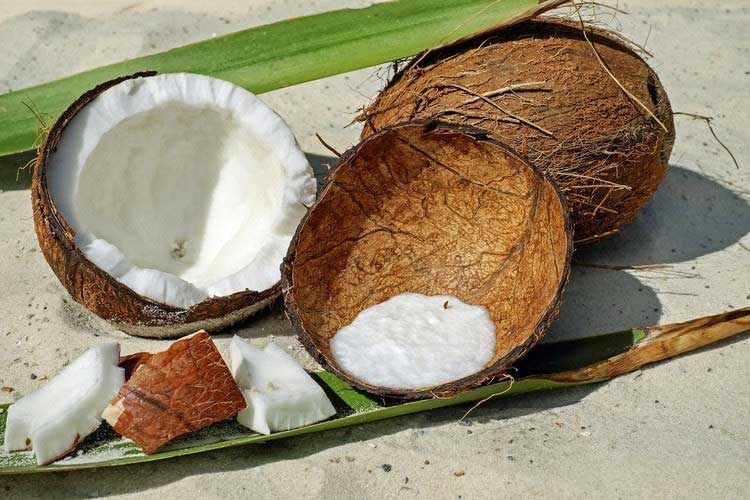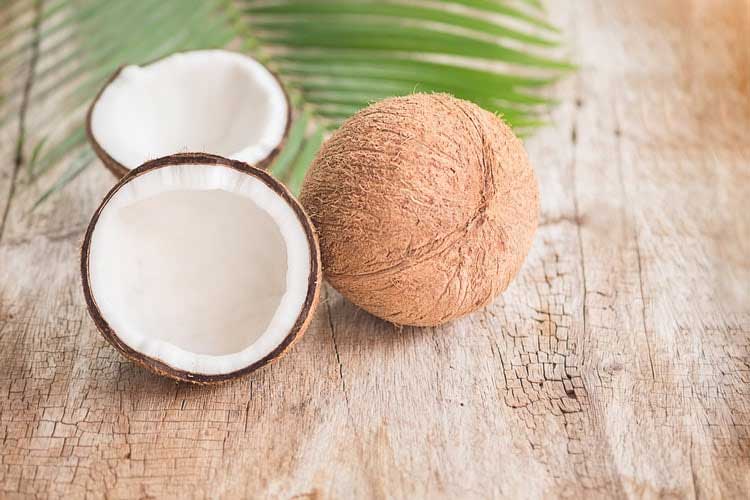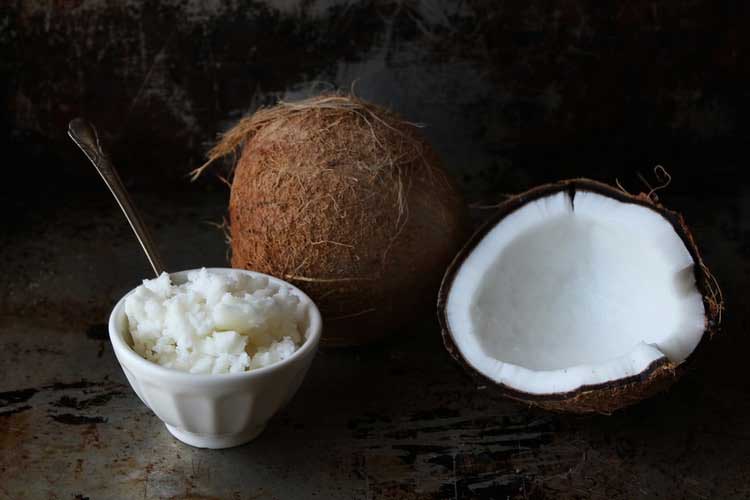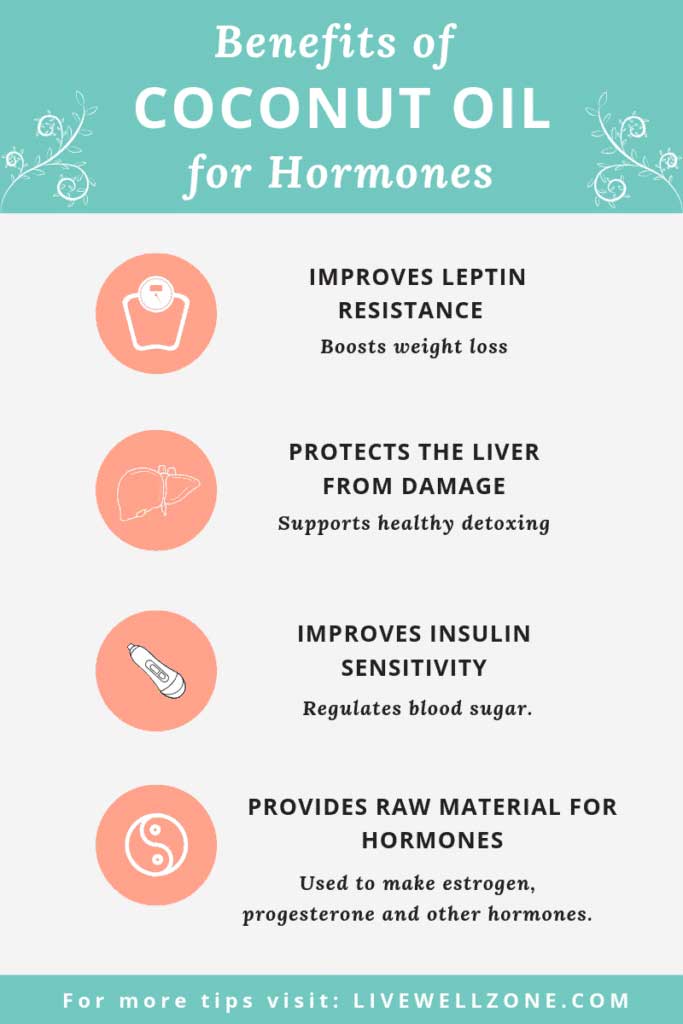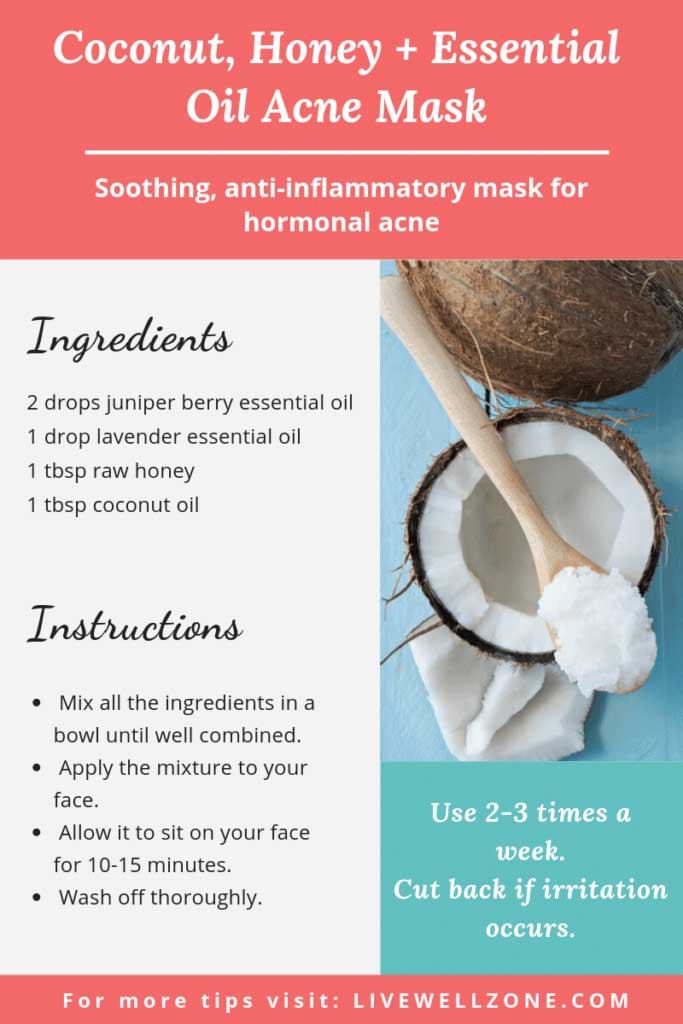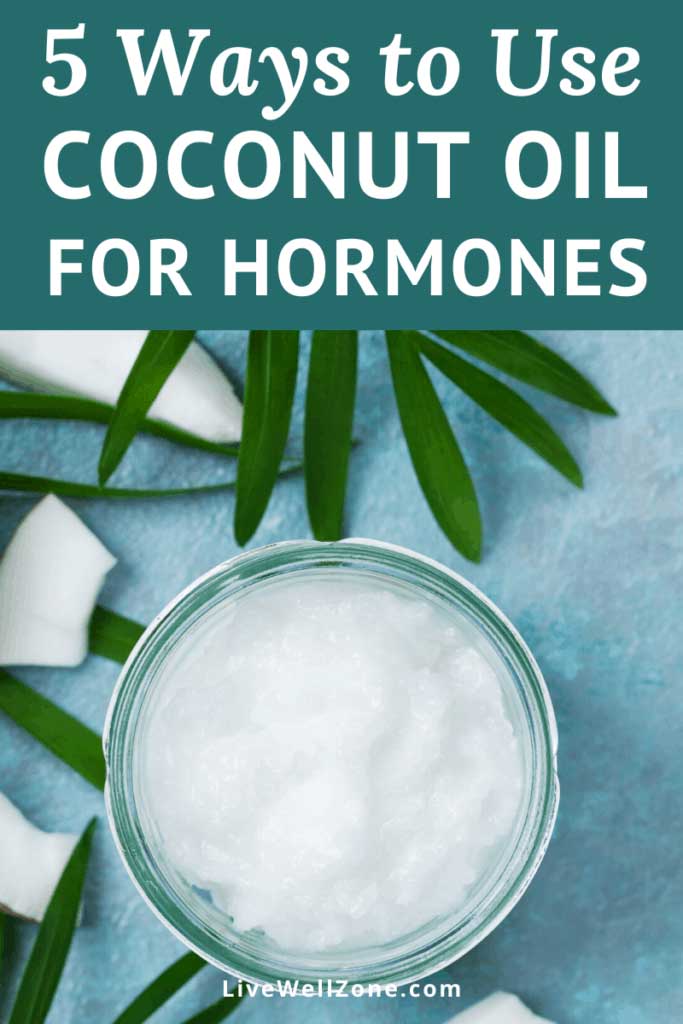Yes, coconut oil is an excellent natural remedy for hormonal imbalance due to its fatty acid content that nourishes the gut, adrenals, immune system, and other systems that affect hormone health.
In fact, coconut oil is so incredibly beneficial for hormonal imbalance that it is one of the 5 hormone-balancing foods that I recommend eating daily.
So, if you’ve been wondering whether coconut oil is worth your time, then keep reading.
By the end of this article you will learn:
- How coconut oil balances hormones.
- The best ways to add coconut oil to use coconut oil for hormone balance.
- What type of coconut oil to use for maximum results.
Coconut oil is made from either fresh or dried coconut “meat” i.e. the fleshy edible part of coconut.
True, unrefined coconut oil is solid at room temperature (approximately 76°F).
Above 76°F, coconut oil starts to melt.
From a nutritional standpoint, coconut oil contains MCTs (medium-chain triglycerides), also known as MCFA (medium-chain fatty acids).
The most notable MCTs in coconut oil are:
- Lauric acid
- Capric acid
- Caprylic acid
Unlike the fats found in other oils (such as olive oil), the MCTs in coconut oil are very easy to digest.
So, this means that coconut oil places less stress on the gut and digestive system.
This is an important benefit because hormonal imbalances usually involve some level of gut and/or digestive imbalances as well.
Therefore, an easy-to-digest oil like coconut oil is very helpful for rebooting digestion, gut health, and ultimately, our hormones.
8 BENEFITS OF COCONUT OIL FOR HORMONE BALANCE
1. Supports Gut Health
Leaky gut syndrome is an inflammatory condition that occurs when the lining of the small intestine is damaged.
When that lining is damaged that means undigested food particles, microbes, toxins, and other foreign particles can “leak” into the bloodstream.
Ultimately, this leads to:
- Contaminated and toxic blood.
- An imbalance in your gut bacteria (i.e. you will have more “bad” bacteria and less of the “good” bacteria).
Both of these two outcomes contribute to chronic inflammation and various hormonal imbalances.
The good news is that coconut oil has been shown to heal leaky gut (source).
So, how does coconut oil do this?
And it’s all thanks to the high levels of medium-chain fatty acids in coconut oil.
You see, not only do the fatty acids help to seal the damaged intestinal wall, but they also promote the growth of healthy gut bacteria.
2. Supports Healthy Adrenal Function
All of the hormones produced by the adrenal glands need fat as their raw material.
Therefore, eating sufficient amounts of natural fat – like coconut oil – is incredibly nourishing for your adrenals.
This is particularly important because the adrenals are responsible for fighting off the stress that we face from food, environmental toxins, and busy schedules.
And the adrenals fight off this stress by producing cortisol, which is the body’s main anti-stress hormone.
So, the more stress you face throughout the day, the more your adrenals need good quality fats to keep up with cortisol production.
Now, this might contradict what we are often told…which is cortisol is bad and it needs to stay low.
The truth is, cortisol isn’t bad. It is excess, chronic production of cortisol that eventually creates problems.
NOTE: during our reproductive years, the ovaries produce most of our sex hormones. However, as menopause approaches, the adrenals become responsible for producing sex hormones. So, if you’re going through menopause, it’s doubly important to support the adrenals because they are now doing extra work.
3. Provides Raw Material for Producing Sex Hormones
Progesterone, estrogens, and androgens (such as testosterone and DHEA), and all made from cholesterol (source).
And in order to make cholesterol, your body uses healthy fats as its raw material.
It just so happens that the medium-chain fatty acids (MCFA) in coconut oil very easy for your body to absorb.
So, when you eat coconut oil your body gets more of the building blocks that it needs to produce and regulates your sex hormones.
Whether you want to improve blood sugar, lose weight or reverse estrogen dominance, coconut oil has you covered.
4. Improves Insulin Resistance
Insulin resistance is a major hormonal imbalance that is linked to weight gain, PCOS, irregular periods, and other hormone-related symptoms (source).
Some studies show that consuming medium-chain triglycerides (such as the ones found in coconut oil) leads to more weight loss when compared to consuming olive oil (1,2).
In addition, coconut oil can boost metabolism, reverse insulin resistance and improve brain function (source).
5. Boosts The Immune System
Coconut oil contains a fatty acid called lauric acid, which is a potent immune booster (source).
This is incredibly beneficial for achieving natural hormone balance because a weak immune system places stress on the body.
And the more stress your body experiences, the more inflammation you will have.
Since inflammation increases cortisol and causes the adrenals to work harder, coconut oil is a simple yet powerful way to support your immune system.
6. Kills Candida and Other Bad Bacteria
Candida is one of the many species of bacteria that normally live in the body and on our skin (source).
However, when there is excessive candida, this leads to yeast infections, inflammation, and gut dysfunction.
All of these factors contribute to hormonal imbalance symptoms.
Coconut oil has been shown to kill candida and other bad bacteria, which ultimately helps reset your hormones (3,4).
7. Improves Leptin Resistance and Supports Weight Loss
Sometimes referred to as the “satiety hormone,” leptin is a hormone that keeps overeating in check.
Basically, when you’ve had enough to eat, leptin sends a signal to your hypothalamus (located in the brain) letting it know that it’s time to stop eating.
When leptin is working correctly, you don’t really need “willpower” to control your eating.
However, if you find yourself struggling to feel “full” when you eat a meal, you could be dealing with leptin resistance.
This is a condition that occurs when the brain has difficulty “reading” leptin signals.
As you’ve probably guessed, leptin resistance can lead to overeating and eventually, excess weight gain.
So, what’s the best way to reverse leptin resistance?
Eat foods like coconut oil, which is high on the “satisfaction index”.
You see, the fat in coconut oil makes you feel full for a longer period of time. So, ultimately you eat less.
In addition, fat improves your body’s ability to absorb nutrients from food.
And the more nutrients you absorb, the more satisfied you feel, which also helps leptin work better (source).
8. Protects The Liver
100% of the toxins that we’re exposed to on a daily basis have to be filtered out by the liver.
And with toxins coming in from food, air, water, cosmetics, and other sources, this means that the liver is working 24/7.
Now, imagine if the liver isn’t able to filter out those toxins fast enough.
You eventually end up with a buildup of toxins that can lead to estrogen dominance, excess androgens, and many other problems.
Thankfully, coconut oil is one of the foods that has been shown to protect the liver from the damaging effects of toxins (5,6).
So, how does coconut oil actually improve liver health?
First, your body is able to use the fatty acids in coconut oil without first producing bile (this is the opposite of what happens with other fats).
Second, the fat from coconut oil fights off microbes that could potentially cause liver infections.
Third, coconut fat is great for preventing tissue damage.
All of this means less workload for the liver and more raw material to regenerate liver cells.
5 WAYS TO USE COCONUT OIL FOR NATURAL HORMONE BALANCE
1. Add Into Smoothies
Adding coconut oil to a hormone-balancing smoothie is a great way to support your health.
Adding ½ to 1 teaspoon coconut oil to your smoothie adds a slight, tropical sweetness.
Plus you get a nice dose of healthy fats.
Just make sure to drink your smoothie once done blending.
The longer the coconut oil sits in a cold smoothie, the more it solidifies. You’ll end up with solid chunks of coconut oil in the smoothies which kills the appeal of your smoothie.
2. Use As A Butter Substitute When Baking
Another way to add coconut oil to your hormone balance diet is to use it in baked goods.
Making the switch is really easy: just do a 1:1 substitution and you’re good to go (source).
3. Incorporate Into Stir-Fries, Soups, Scrambles, and Other Dishes
Making scrambled eggs? Use coconut oil.
How about when you’re sauteing onions or veggies? Coconut oil works well for these too!
Even when I make Asian-style stir-fries, I use coconut oil. And in case you’re wondering, it doesn’t ruin the traditional stir-fry flavor at all!
4. Add It to Your Skin Care Routine
Whether you use it as a moisturizer, makeup remover, or in a face mask recipe, coconut oil is a healthy choice for acne-prone skin.
Coconut oil works really well as a gentle moisturizer and makeup remover.
It can be particularly beneficial if you have acne.
You see, many popular moisturizers and anti-acne products contain ingredients that actually damage your hormones and cause more irritation in the long run.
In addition, many anti-acne cleansers can be very abrasive, which means they end up stripping your skin of natural oils.
Furthermore, when you over-clean the skin, you actually kill the good bacteria that sits on the skin (yep your skin has good bacteria, just like the gut).
So, if you struggle with acne, avoid abrasive cleansers and start moisturizing with coconut oil.
In the same way that coconut oil promotes the growth of healthy gut bacteria, it also promotes the growth of healthy skin bacteria.
5. Make An Anti-Inflammatory Face Mask
For hormonal acne, try this coconut-based face mask recipe 2 to 3 times a week.
Honey and Coconut Oil Face Mask
Ingredients
2 drops juniper berry essential oil
1 drop lavender essential oil
1 tbsp raw honey
1 tbsp coconut oil
How to Make
- Mix all the ingredients in a bowl until well combined.
- Apply the mixture to your face.
- Allow it to sit on your face for 10-15 minutes.
- Wash off thoroughly.
- Use this mask 2 to 3 times a week. Cut back if any irritation develops.
THE BEST TYPE OF COCONUT OIL TO USE FOR HORMONAL IMBALANCE
Without a doubt, the best type of coconut oil to use for hormone balance is virgin, unrefined, cold-pressed coconut oil.
This type of coconut oil has a strong odor and flavor.
By using unrefined coconut oil you get all of the beneficial nutrients (many of which are lost when you use odorless, refined coconut oil).
Lastly, truly unrefined coconut oil is solid at room temperature (about 76°F).
It’s important to avoid buying liquid, coconut oils (usually labeled fractionated coconut oil) because they have been processed and lack essential nutrients.
As for where to get your coconut oil, every grocery store carries them these days.
My personal favorite – which I’ve been using for about 4 years now – is this organic, unrefined, cold-pressed coconut oil.
HOW MUCH COCONUT OIL SHOULD YOU EAT PER DAY FOR HORMONE HEALTH?
A minimum of 2 tablespoons of coconut oil per day has been shown to reduce abdominal fat and support weight loss (source).
Keep in mind that some people experience diarrhea when using coconut oil for the first time.
So, if you are new to eating coconut oil (and you have a very sensitive tummy) you may want to start with less than 2 tablespoons per day.
Once your digestive system becomes accustomed to it, you can comfortably increase to 2 or more tablespoons.
IN CONCLUSION: IS COCONUT OIL GOOD FOR HORMONES?
Absolutely. The nutrients in coconut oil support various systems and organs that affect our hormones, making coconut oil an important food to include in a hormone balance diet.
Now, before I wrap up this post, you might have heard other reports about coconut oil being unhealthy.
These claims are based on the idea that saturated fats – which are found in coconut oil – raise “bad” cholesterol (i.e. LDL) which can lead to heart disease.
But the problem with this line of thinking is that it’s looking at just one factor. It’s an over-simplification of a multi-factorial problem.
Heart disease results from inflammation, which itself results from a combination of all lifestyle and dietary habits.
Truth is, saturated fats, like coconut oil, are actually necessary for fighting inflammation and supporting the liver (source).
So, adding good quality, nutrient-rich coconut oil to your diet is one of the many things you can do to help reset your hormones.
Important Notice: This article was originally published at www.livewellzone.com by Germaine where all credits are due.
Disclaimer
The watching, interacting, and participation of any kind with anything on this page does not constitute or initiate a doctor-patient relationship with Dr. Farrah®. None of the statements here have been evaluated by the Food and Drug Administration (FDA). The products of Dr. Farrah® are not intended to diagnose, treat, cure, or prevent any disease. The information being provided should only be considered for education and entertainment purposes only. If you feel that anything you see or hear may be of value to you on this page or on any other medium of any kind associated with, showing, or quoting anything relating to Dr. Farrah® in any way at any time, you are encouraged to and agree to consult with a licensed healthcare professional in your area to discuss it. If you feel that you’re having a healthcare emergency, seek medical attention immediately. The views expressed here are simply either the views and opinions of Dr. Farrah® or others appearing and are protected under the first amendment.
Dr. Farrah® is a highly experienced Licensed Medical Doctor certified in evidence-based clinical nutrition, not some enthusiast, formulator, or medium promoting the wild and unrestrained use of nutrition products for health issues without clinical experience and scientific evidence of therapeutic benefit. Dr. Farrah® has personally and keenly studied everything she recommends, and more importantly, she’s closely observed the reactions and results in a clinical setting countless times over the course of her career involving the treatment of over 150,000 patients.
Dr. Farrah® promotes evidence-based natural approaches to health, which means integrating her individual scientific and clinical expertise with the best available external clinical evidence from systematic research. By individual clinical expertise, I refer to the proficiency and judgment that individual clinicians acquire through clinical experience and clinical practice.
Dr. Farrah® does not make any representation or warranties with respect to the accuracy, applicability, fitness, or completeness of any multimedia content provided. Dr. Farrah® does not warrant the performance, effectiveness, or applicability of any sites listed, linked, or referenced to, in, or by any multimedia content.
To be clear, the multimedia content is not intended to be a substitute for professional medical advice, diagnosis, or treatment. Always seek the advice of your physician or other qualified health providers with any questions you may have regarding a medical condition. Never disregard professional medical advice or delay in seeking it because of something you have read or seen in any website, video, image, or media of any kind.
Dr. Farrah® hereby disclaims any and all liability to any party for any direct, indirect, implied, punitive, special, incidental, or other consequential damages arising directly or indirectly from any use of the content, which is provided as is, and without warranties.


